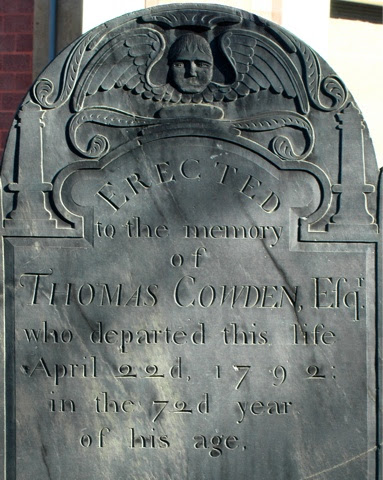While I’m out of town this weekend at a conference, I’m gratefully taking the opportunity to run some guest postings from Bob O’Hara, sharing the story of a prominent man from central Massachusetts.
This year is the 250th anniversary of the founding of Fitchburg, which was set off from its parent town of Lunenburg in 1764. In honor of that anniversary it’s worth remembering “Squire Cowdin,” who was for many years one of the young town’s biggest men.
If you stand today at Fitchburg’s minuteman monument, on the banks of the Nashua River in the heart of the city, and look to the southwest, you can just make out on the crest of the nearby Laurel Hill Cemetery one of the largest obelisks on the grounds: the memorial to Thomas Cowdin, Esquire.
Cowdin was born on Christmas Day in 1720 in the north of Ireland, the first son of James Cowdin and his wife Janet (Craige) Cowdin, who emigrated to New England about 1728 and who settled, along with many other Scots-Irish migrants of the time, near Worcester.
Thomas grew up and in 1748 married, in Worcester, Experience Grey or Gray, with whom he had four children. Experience died in 1760, and in Rutland the next year Thomas married Hannah Craige, with whom he had nine more children, for a total of thirteen in all. Thomas himself always wrote his surname “Cowdin,” but it often appears as “Cowden” in the documents of the time.
As a young man Thomas Cowdin served king and country at the first siege of Louisbourg during King George’s War in 1745, and then later as captain of a company of foot at Crown Point during the French and Indian War in 1762.
Soon after Fitchburg was incorporated, Thomas and his second wife removed to the new town, perhaps sensing opportunity. By the time of the 1771 tax census Thomas was by far the wealthiest man in the community, owning forty acres of mowing land and fifty acres of pasture, as well as one of the two taverns in the town. He also had two “servants for life,” as the tax valuation called them.
When Massachusetts broke out in open armed rebellion in the spring of 1775, Thomas Cowdin was fifty-four years old, so he might have been excused from marching to confront the redcoats. But when the alarm guns were fired on the morning of the Lexington Alarm, he tried to prevent two of his hired hands from setting aside their work and going to the militia assembly point.
TOMORROW: The transformation of Thomas Cowdin.

Thomas Cowdin was my great great grandfather (give or take a great)
ReplyDeleteHe was also one of my great grandfathers.
Delete